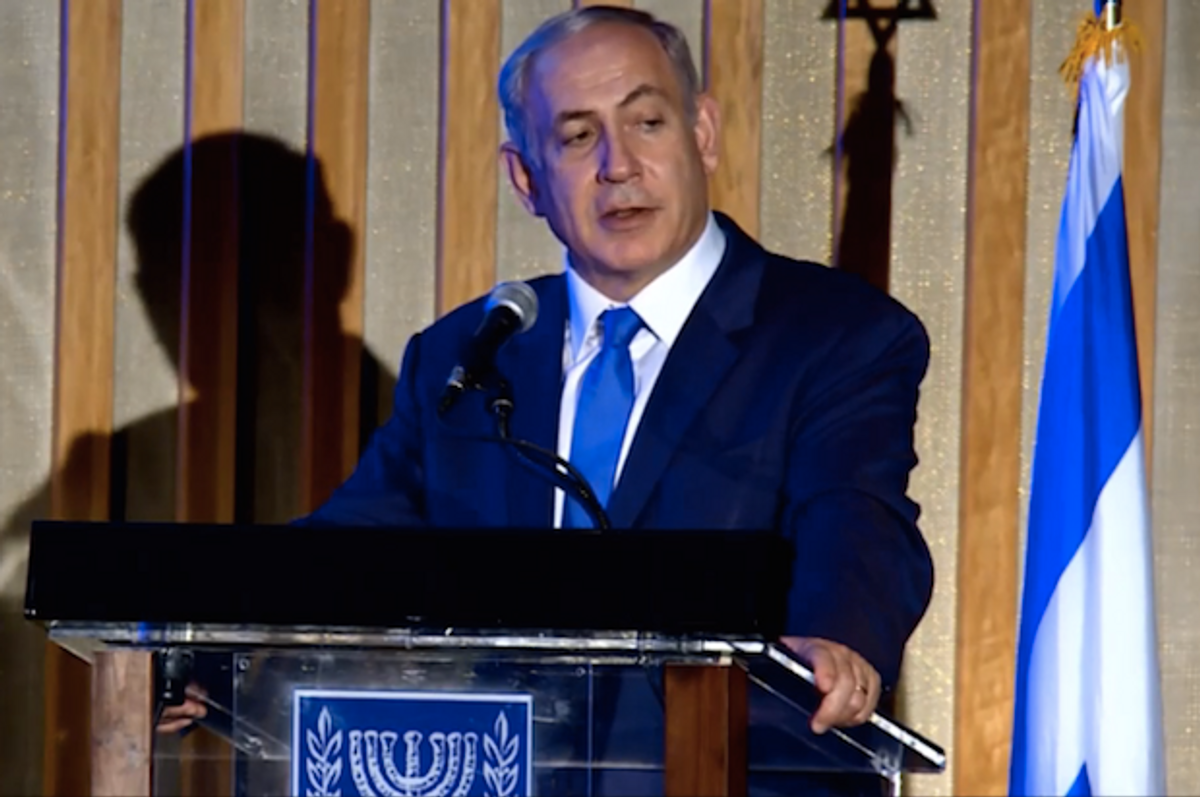In a speech at the United Nations on Thursday, Israeli Prime Minister Benjamin Netanyahu said that "savages" who threaten society must be fought, emphasizing that leaders "have to keep pulling out the weeds."
Netanyahu was speaking at an event on "Israeli Technology and Innovation for Africa" at U.N. headquarters in New York.
He spoke fondly of a trip to Rwanda that was "kindly hosted" by dictator Paul Kagame, and also got the name of an African country wrong.
A video of the speech was uploaded to the Israeli prime minister's YouTube channel:
Netanyahu is leader of Israel's hard-line right-wing Likud party. His current government is regarded by many observers as the most right-wing in Israel's history.
The Israeli prime minister held a special meeting on Thursday with a dozen heads of state and representatives from African countries, outside the 71st U.N. General Assembly. After the meeting, he spoke at the event on innovation in Africa.
Netanyahu discussed how technology has "revolutionized" the world. He said he had told the leaders about a "requirement" to preserve technological progress.
"The possibilities we have in agriculture, in water, in health, in education, in energy ... in every field, all those possibilities have one basic requirement — and that requirement is security," Netanyahu said.
"We cannot let the savages overcome our societies. We have to fight them," he added.
Netanyahu recalled an anecdote: When he was six years old, Netanyahu went outside and saw his father working in the garden. Netanyahu helped his father plant saplings, and said "perhaps the most telling thing" he learned was that one must always "pull out the weeds."
A year after helping his father in the garden, Netanyahu recalled coming outside and seeing his father working again in the same spot. Netanyahu the elder asked his son again for help pulling weeds.
"Then I protested," the Israeli prime minister said in his speech. "I said, 'But father, we pulled out the weeds last year!'"
"He said, 'You have to keep pulling out the weeds,'" Netanyahu continued, to applause from the audience.
"This is what we do," Netanyahu said. "We in Israel have planted our young sapling in the ancient soil of our people. We have watered it with creativity. We have tended to it with every aspect of our commitment. We've protected the tree from storms. Now the tree is growing and growing and growing."
"This is what we'd like to do with you," Netanyahu told the audience. "We'd like you to benefit from the fruits of the tree of knowledge that we have planted."
In his speech, Netanyahu also recalled a trip he and his wife took to "four African countries" two months before. He called the trip "moving," and said the countries "spoke to our hearts."
During their trip to Rwanda, "President Kagame kindly hosted us throughout," Netanyahu noted. Kagame is viewed by many activists and advocates as a repressive dictator, although he has been applauded by many Western leaders. Human rights groups have spoken out against the imprisonment, exile, torture and even assassination of Rwandan dissidents. Kagame's speech at Yale University this week was met with protests led by rights groups.
Netanyahu affirmed a "deep and abiding bond" with the four African countries he visited. He noted that some Israelis have migrated from Ethiopia, naming Israeli lawmaker Avraham Neguise. "So there is a human bond there that endures," Netanyahu said.
What Netanyahu did not acknowledge is that Ethiopian Jews face systematic discrimination within Israel, and have held large protests against racism and police brutality, much like Black Lives Matter activists in the U.S.
In his speech, Netanyahu also noted that some Zionist militants who had been fighting for the establishment of the state of Israel before 1948 were exiled to Africa by the colonial British Mandate regime.
Netanyahu cited the story of Yitzhak Shamir, a former leader of Lehi — a Zionist paramilitary that was initially pro-fascist and hoped to create a state of Israel "based on nationalist and totalitarian principles" — who later became Israel's seventh prime minister, representing the Likud party, which Netanyahu now leads.
The British colonial regime arrested Shamir and exiled him to Eritrea, as the Israeli Ministry of Foreign Affairs notes on its website.
In his speech, however, Netanyahu claimed Shamir escaped from British internment in Kenya.
"But I may be wrong about the African country," the Israeli prime minister added. He looked into the audience and subsequently corrected himself: "I am wrong about the African country."



Shares